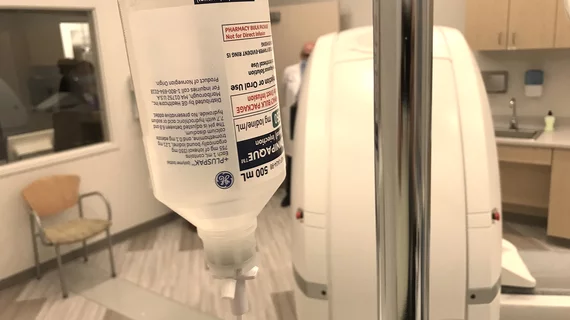Contrast shortage update: Supplies could continue to lag until September
The nationwide shortage of iodinated contrast media could last until late September, according to multiple leaders in the healthcare community.
On June 14, GE—the main provider of the United States’ iodinated contrast media supply—indicated that the production of Omnipaque (iohexol) had returned to 100% capacity since COVID restrictions had been eased in Shanghai, where the product is manufactured. Prior to that, GE suggested that the supply of ICM was expected to stabilize by the end of June. But new insight into the situation coupled with the expiration of that timeframe contradicts the notion that supplies will "progressively recover," as GE previously stated.
Representatives from both the American Hospital Association and Alberta Health Services recently cautioned that the shortages could continue to impact the healthcare system through the end of September. Alberta Health Services recently shared that the ICM shortage had caused a delay in more than 2,400 exams, and that cancellation or delay of thousands more are still on the horizon. They do not expect the supply snags to resolve until the fall, despite preservation efforts.
One of many ICM mitigation strategies hospitals and clinics have deployed has been the use of alternative imaging modalities in order to preserve supplies for the most urgent cases. This has led to an increase in MRI exams that utilize gadolinium as a contrast agent to enhance anatomy on scans. Though necessary, this has created additional dilemmas for imaging departments, says Mike Schiller, the American Hospital Association's senior director of supply chain, in a statement to Becker’s Hospital Review.
"As a result of the contrast media shortage, we are hearing of health care systems shifting essential CT scans to MRIs when an MRI is an appropriate alternative. This has created an unexpected increase in demand for Gadolinium.”
GE has taken several steps to help blunt the impact of the shortage, including increasing production of ICM products at their manufacturing facilities in Cork, Ireland, and adjusting logistics to speed up deliveries, but they have not recently provided an updated timeframe for when they expect the situation to resolve.
Health Imaging will continue to share updates as they become available.
More on the iodinated contrast media shortage:
GE provides update on contrast media shortage
Contrast shortage update: GE expects supply to 'progressively recover' soon
Contrast shortage update: House Members urge President Biden to intervene
ACR working with FDA and HHS to help address imaging contrast shortage
Addressing contrast media shortage in the short, mid and long term
Preserving contrast media supplies: 7 ACR recommendations

